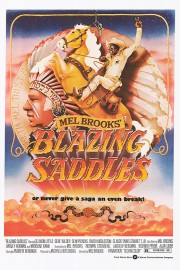Blazing Saddles
I honestly don’t remember whether I’ve seen “Blazing Saddles” all the way through until this time, which is, quite frankly, stunning considering how omnipresent Mel Brooks’s films have been throughout my life. Of course I’ve seen a good amount of it over the years, but I can’t say that I watched all 93 minutes of this part of Brooks’s 1974 double team, the other part of which was the equally-classic “Young Frankenstein.” On the occasion of it’s 40th anniversary, I felt the time had come to add it to my memory banks for good. It was well worth it.
In his later years, Brooks’s parodies became more blatant in their formula, adhering less to the genres they spoofed, and more to being a collection of gags and bits hung together by a threadbare plot. But with “Blazing Saddles” and “Young Frankenstein,” he played straight to the formulas of the western and horror movie, respectively, and let the comedy come out of character and story. Don’t get me wrong– the likes of “High Anxiety,” “Spaceballs,” and “Robin Hood: Men in Tights” have their charms, but even those film’s most ardent fans have to admit that compared to “Saddles” and “Frankenstein,” they fall short. Watching “Saddles” finally only illustrates just how far.
The story would play like gangbusters in a straight western (and actually, seems to bare some influence of last year’s big-budget disaster, “The Lone Ranger”). A corrupt city official (played by Harvey Korman) is using former slaves and Chinese labor, run by desparados (led by Slim Pickens), to build a railroad. When the direction they begin in leads to a pit of quicksand, they decide to go through the town of Rock Ridge. Terrified at the pillaging Pickens and his crew brings to the town in an attempt to run the citizens out of town, the townsfolk ask the governor (Brooks) for a new sheriff. They never expected somebody like Bart (Cleavon Little), though, who is handpicked by Korman’s Headly Lamarr as a deterrent for the people, and incentive for them to leave. What could possibly do that? Did I mention Bart is black? The reception he gets is pretty much what you expect, although he does get an unexpected ally in Jim “The Waco Kid” (Gene Wilder) to help him when shit starts to go down.
I’m left wondering, as I watched Brooks’s film, if I’m the only one who sees how the past five-plus years with a black president has run parallel with the chilly, racially-charged attitude of Rock Ridge’s population when Bart rides into town. How does Bart get out of having the entire town pointing a gun to his head? He puts his OWN gun to his head, and threatens to kill himself if they don’t give into his demands. The only difference between that movie and the real world now is that the president’s detractors would be perfectly satisfied with him pulling the trigger on himself. A black sheriff may have worked in “Blazing Saddles,” but it doesn’t really seem like we’ve reached the racial harmony Brooks espouses at the end of his 1974 comedy about the 1870s Old West, to which I say, sigh.
I don’t want to talk politics when given the chance to discuss one of the greatest comedies of all-time, though, but honestly, it’s impossible not to when faced with a less optimistic reality than Brooks saw decades ago. Working in collaboration with a team of writers that included Richard Pryor, and a core story by Andrew Bergman, Brooks brought a vitality and endearing vulgarity to the film that makes hilarity a forgone conclusion at many times, the infamous “campfire” scene, and when a saloon singer (played by the peerless Madeline Kahn) tries to get Bart to quit, and finds herself drawn to his, um, firearm. In a lot of ways, Brooks set the template for modern parody filmmaking much earlier than the film usually given the credit (or stinkeye) for doing so, 1980’s “Airplane!,” and he did it by playing right to the conventions of the genre’s storytelling, but in a way that addressed issues like corruption and racism that never really were explored in many straight films in the western’s history. Leading the way on-screen are Little and Wilder, who make a hilarious, sincere pairing that brings out the best in everybody else from the cast, and from Brooks, as well, who may have continued to be prolific over the years (until he all but retired from filmmaking in 1995), but never quite recaptured the magic on display 40 years ago with not just this masterpiece, but “Young Frankenstein.” Still, even if he said he was going to remake “Blazing Saddles” or make a spoof of the comic book genre, I would, at least, give it a shot, because Mel Brooks’s voice is one of the greatest comedy filmmaking has ever had, and it is sorely missed at times.










